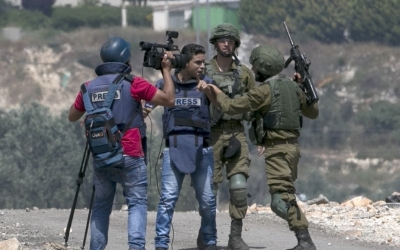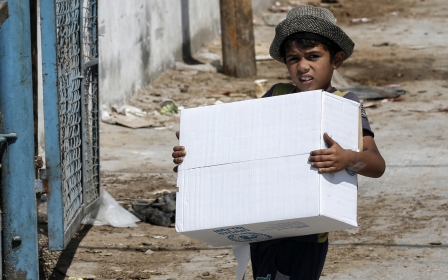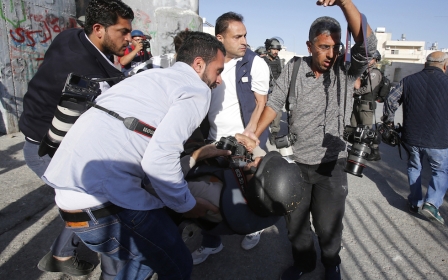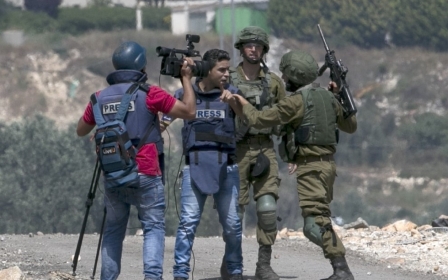Palestinians decry PA website ban as 'attack' on media

The Palestinian Authority has blocked 59 Palestinian news websites and social media pages, following a request by the attorney-general, a move that journalists and civil society activists say aims to stifle dissent and criticism of the PA government.
The PA accused the banned websites of insulting PA officials, publishing articles and pictures that threaten Palestinian "national security" and "civil peace", and negatively affecting Palestinian public opinion.
Critics have pointed to the popular uprisings in Lebanon and elsewhere in the region, claiming that the clampdown on media is an attempt by the PA to ensure Palestinians don't follow suit.
'The Palestinian Authority is afraid that the press exposes corruption, which may lead to a popular explosion similar to what is happening in Lebanon'
- Ahmad Zoabar, union representative
The ban was first reported by Maan, a Palestinian news agency that has close ties to the PA. It targeted websites and social media pages that are critical of the PA and some that are perceived as supportive of Mohammed Dahlan, Palestinian President Mahmoud Abbas' exiled rival.
The court order to block access to the websites came on Monday after a request by the public prosecutors' office under Article 2/39 of the Law on Electronic Crimes, Maan said.
Palestinian internet service providers and telecommunications companies implemented the decision right after the announcement.
The PA faced a widespread backlash when the Electronic Crimes Law was passed by executive decree in 2017, with critics accusing the West Bank-based administration of seeking to stem opposition voices and criticism of its political and economic policies, including its ongoing security coordination with Israel.
Samidoun, the Palestinian prisoner solidarity network, said on Monday that the decision to ban the websites "reveals its fear of a popular explosion against it similar to the Arab revolutions, the latest of which is Lebanon".
The banned websites are all considered to be in opposition to the PA, and they include Quds News Network and Arab48.
For Ahmed Jarrar, the director of Quds News Network, this is the second time that the PA has blocked access to the media outlet's website. Established in 2013, the network is followed by more than 7.8 million people on social media.
Jarrar told Middle East Eye that Quds News staff are also frequently harassed by Israeli and PA security forces, including being prevented from covering protests as well as regular security checks.
He described the decision to block the websites as a "massacre against the Palestinian media".
"We have previously approached the Palestinian judiciary and we will go again despite our feeling that it is not a judicial decision. We will also contact human rights and international institutions to support us and stop this decision," Jarrar said.
'Blocking is a crime'
Since the ban was implemented, Palestinian journalists, human rights defenders and lawyers have joined a spontaneous electronic campaign under the slogan, "Blocking is a crime", to demand that the order be rescinded.
Omar Nazzal, a general secretariat member of the Palestinian Journalists Syndicate (PJS), said the decision to block the websites was shocking and constituted a black day for the Palestinian press.
"This decision is an attack on freedom of opinion and expression, and the citizens' right to receive information from various sources," Nazzal told MEE.
Nazzal pointed out that the PJS had previously warned against the destructive effects the Cybercrime Law would have on media in Palestine. "We earlier said that this law is a sword unsheathed on journalists' necks," he said.
'This decision is an attack on freedom of opinion and expression, and the citizens' right to receive information from various sources'
- Omar Nazzal, Palestinian Journalists Syndicate
In Gaza, a group of journalists held a demonstration in front of the local journalists syndicate office to express their rejection of the ban.
They said the move relates to the PA's fear that Palestinians could take to the streets - in line with "Arab revolutions" happening across the region - to protest their own political and economic hardships.
A spokesman for the Gaza syndicate, Ahmad Zoabar, told MEE that blocking the websites is a political decision that serves Israel, which is preventing Palestinian journalists from exposing PA corruption.
"The Palestinian Authority is afraid that the press exposes corruption, which may lead to a popular explosion similar to what is happening in Lebanon," Zoabar said.
Thousands of Lebanese protesters took to the streets this month to protest state corruption and the country's dire economic situation. They have since called for the overthrow of the Lebanese government and members of the ruling class.
Law shrouded in secrecy
The Electronic Crimes Law was first adopted "in secrecy" in 2017 and did not include the input provided to the PA by Palestinian civil society institutions, said Issam Abdeen, a legal adviser at Palestinian human rights group Al-Haq.
After widespread backlash, it was amended and passed again the following year.
But those "amendments were insufficient", Abdeen told Middle East Eye.
Article 39 of the legislation is particularly troublesome, Abdeen said, as it "allows the security services to submit a request to the attorney-general to block the websites and is then sent court, whose only task is to examine the decision within 24 hours".
Websites and links can be blocked if the authorities decide they "may threaten the national security, civil peace, public order or public morals", the article states.
Al-Haq and other Palestinian human rights organisations have asked for Article 39 and other articles in the law be amended, but Abdeen said their demands were rejected. That "prompted us to freeze our membership in the committee formed to amend the law," Abdeen said.
"This law is one of the most serious and dangerous [pieces of] legislation for freedom of opinion and expression, media freedoms and digital freedoms, and access to information."
Mohammed al-Hajjar contributed additional reporting from Gaza
This article is available in French on Middle East Eye French edition.
Middle East Eye propose une couverture et une analyse indépendantes et incomparables du Moyen-Orient, de l’Afrique du Nord et d’autres régions du monde. Pour en savoir plus sur la reprise de ce contenu et les frais qui s’appliquent, veuillez remplir ce formulaire [en anglais]. Pour en savoir plus sur MEE, cliquez ici [en anglais].





